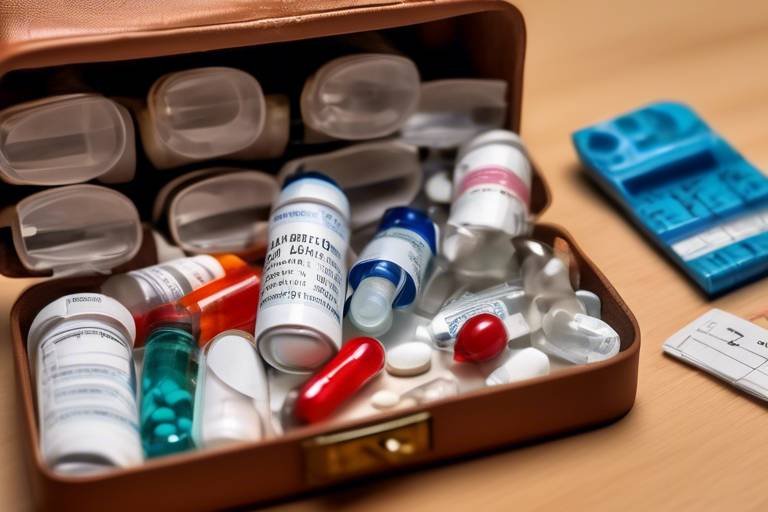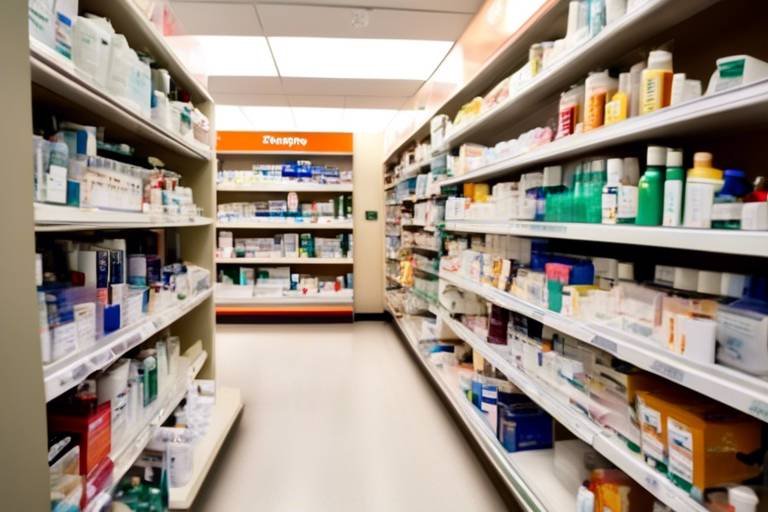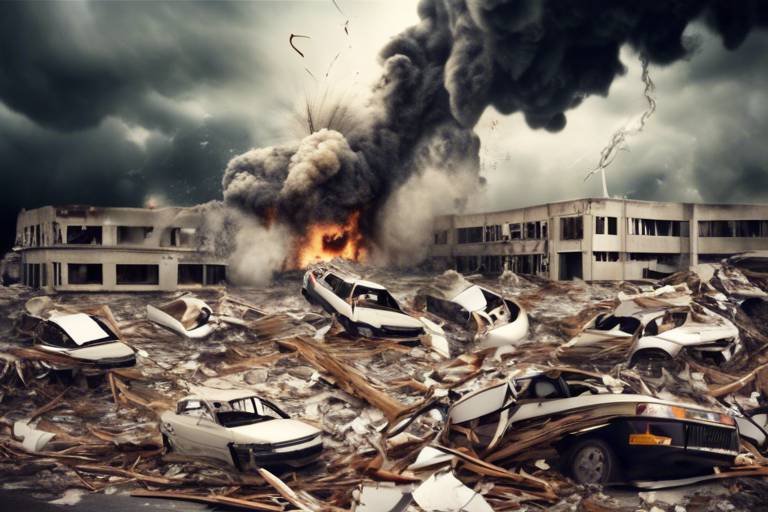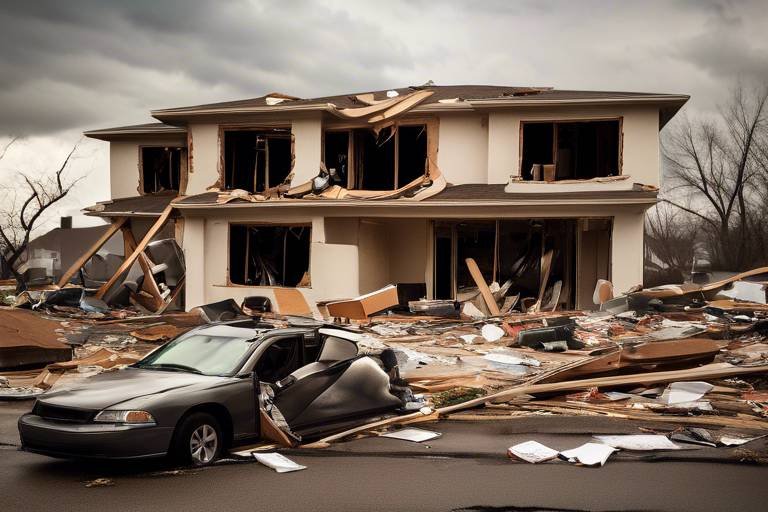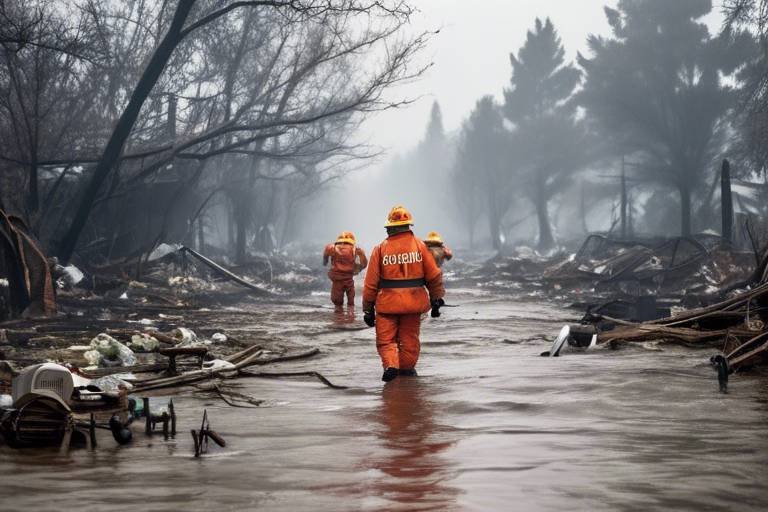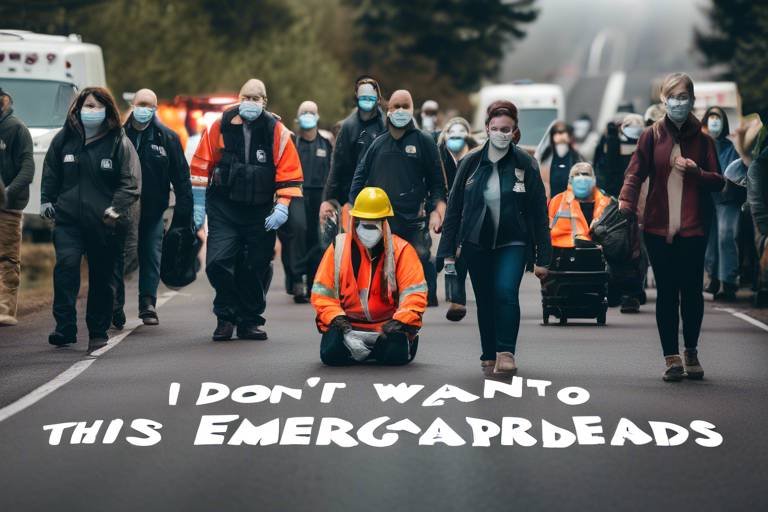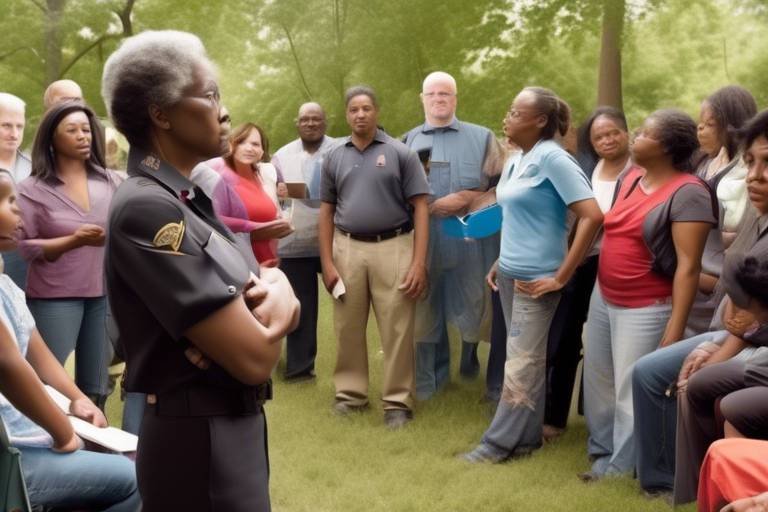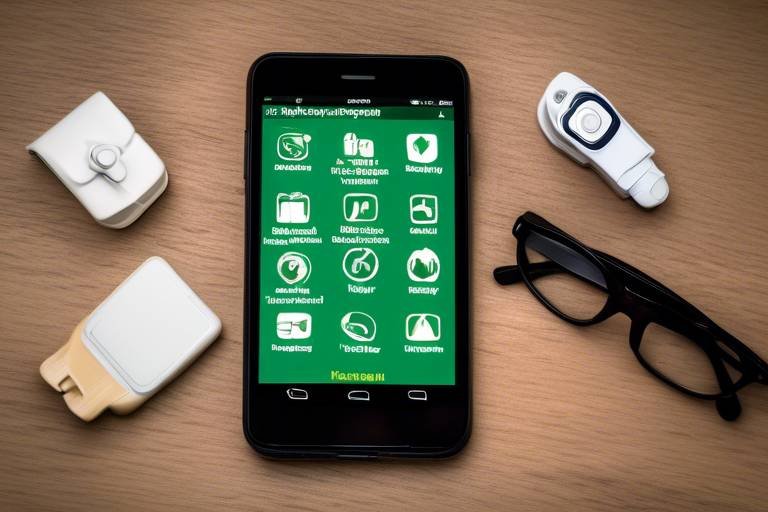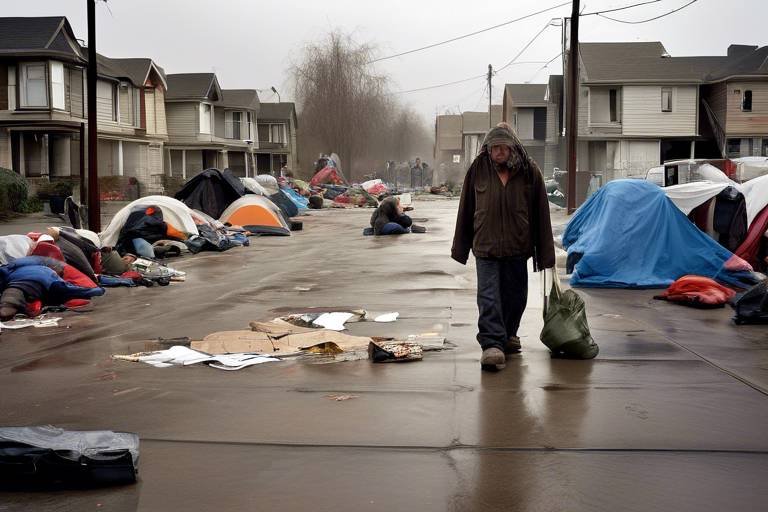The Lifesaving Role of Medication in Your Emergency Kit
In an unpredictable world where emergencies can strike at any moment, having an emergency kit is not just a good idea; it’s a necessity. Imagine being caught in a natural disaster, a sudden illness, or even a minor accident without the right medications at hand. It’s a scenario that can turn from bad to worse in an instant. This is where the lifesaving role of medication in your emergency kit comes into play. It’s not just about packing a few band-aids and calling it a day; it’s about ensuring that you’re prepared for the unexpected.
Having the right medications can mean the difference between a manageable situation and a full-blown crisis. Think of your emergency kit as your personal lifeline. Just like a fire extinguisher is essential for putting out flames, the medications you choose to include can help extinguish health-related fires before they escalate. From pain relief to allergy management, each medication serves a specific purpose that could potentially save a life.
When assembling your emergency kit, it’s important to consider not just the types of medications you might need, but also the specific situations you could encounter. For instance, if you or a family member has a history of severe allergic reactions, having antihistamines readily available is crucial. Or, if someone in your household suffers from chronic pain, including pain relievers can provide immediate relief in stressful situations. The goal is to create a kit that addresses the unique health needs of your household.
Moreover, understanding how to properly store these medications is just as important as having them on hand. Medications can lose their effectiveness if not stored correctly, which is why you need to consider factors like temperature control and expiration dates. Just think about it: what good is a medication if it’s past its prime or has been exposed to extreme temperatures? It’s like trying to use a broken tool; it simply won’t work when you need it the most.
In addition to having medications readily available, it’s essential to equip yourself with the knowledge of how to use them. This is where training comes into play. Knowing when and how to administer medication can be just as crucial as having the medication itself. You wouldn’t want to find yourself fumbling through instructions while a loved one is in distress. Basic first aid training can empower you to act swiftly and effectively, turning you from a bystander into a lifesaver.
In conclusion, the role of medication in your emergency kit is not just about being prepared; it’s about being proactive in safeguarding your health and the health of those around you. Taking the time to carefully select, store, and understand the medications you include can make all the difference in a crisis. So, as you gather your supplies, remember: it’s not just about what you have, but how well you’re prepared to use it.
- What medications should I include in my emergency kit? - Essential medications may include pain relievers, allergy medications, and any prescription medications for chronic conditions.
- How should I store medications in my emergency kit? - Medications should be stored in a cool, dry place and checked regularly for expiration dates.
- Is it necessary to have prescription medications in my emergency kit? - Yes, if you or a family member relies on specific medications, it’s vital to have them on hand in case of emergencies.
- Can I use over-the-counter medications for serious conditions? - Over-the-counter medications can manage minor issues, but for serious conditions, always consult a healthcare professional.

Essential Medications to Include
When it comes to emergencies, having the right medications on hand can be the difference between a minor inconvenience and a life-threatening situation. Think of your emergency kit as a safety net, where each medication serves a specific purpose, ready to spring into action when needed. So, what should you include in this essential kit? Let's dive into the world of vital medications that everyone should consider packing.
First and foremost, it's important to acknowledge that not all medications are created equal. Some are crucial for immediate relief, while others are more about long-term management. Here’s a breakdown of key medications that should be staples in your emergency kit:
- Pain Relievers: Medications like ibuprofen and acetaminophen are essential for managing pain and reducing fever. They can help you cope with discomfort during stressful situations.
- Allergy Medications: Antihistamines, such as diphenhydramine (Benadryl), are critical for anyone prone to severe allergic reactions. They can provide quick relief from symptoms like itching, hives, or swelling.
- Antibiotics: If you have a prescription for antibiotics, having a few doses can be lifesaving in case of infections. Make sure to consult your doctor about which antibiotics are appropriate for your kit.
- Digestive Aids: Medications for nausea, diarrhea, or constipation can help manage unexpected stomach issues that often arise in stressful situations.
Each of these medications plays a unique role in your emergency preparedness. For instance, pain relievers can help you stay focused and functional when every minute counts. Imagine being in a situation where you’ve sprained an ankle or have a headache; having pain relief readily available can make a world of difference.
Similarly, allergy medications can prevent a minor allergic reaction from escalating into something more severe. If you or someone in your care has a known allergy, these medications are absolutely non-negotiable. Now, you might be wondering how to determine which medications are right for you. It's essential to consider your personal health needs. For example, if you have chronic conditions, you should ensure that your kit includes any necessary prescription medications.
In addition to these essentials, consider including a small supply of any medications that you or your family members regularly take. This proactive approach can be a lifesaver in emergencies. Remember, it's not just about having the medications; it's about having the right ones that cater to your specific needs.
Lastly, it's worth mentioning that while we're focusing on medications, don't forget about the importance of first aid supplies, which can complement your medications in an emergency. Bandages, antiseptics, and other first aid items can work hand in hand with your medications to provide comprehensive care in unexpected situations.
In conclusion, packing your emergency kit with essential medications is a vital step in ensuring your safety and well-being during crises. By carefully selecting the right medications, you can take control of your health when it matters most.

Over-the-Counter vs. Prescription Medications
When it comes to preparing your emergency kit, understanding the difference between over-the-counter (OTC) and prescription medications is crucial. Both types of medications serve important roles, but they cater to different needs and situations. OTC medications are readily available without a doctor's prescription and are designed to treat minor ailments. Think of them as your first line of defense against everyday health issues. For instance, if you suddenly develop a headache or experience seasonal allergies, grabbing an OTC pain reliever or antihistamine can be a lifesaver.
On the other hand, prescription medications are specifically tailored for individuals with particular health conditions. These medications require a doctor's approval and are often more potent than their OTC counterparts. For example, someone with chronic conditions like diabetes or asthma must have their prescribed medications on hand. Imagine being in a situation where you need your insulin or inhaler—without these medications, a critical situation could quickly escalate.
It’s essential to recognize that while OTC medications can address minor issues, they may not suffice in more serious situations. In emergencies, having the right prescription medications can mean the difference between life and death. Therefore, your emergency kit should include both types of medications to ensure comprehensive coverage for various health scenarios.
To make it clearer, here’s a quick comparison:
| Type of Medication | Availability | Common Uses |
|---|---|---|
| Over-the-Counter | No prescription needed | Headaches, allergies, colds, minor pain |
| Prescription | Requires a doctor's prescription | Chronic conditions, severe pain, specific infections |
In conclusion, having a mix of both OTC and prescription medications in your emergency kit is not just a good idea—it's a necessity. This blend ensures you are prepared for a wide range of health scenarios, allowing you to respond effectively to whatever life throws your way. Always consult with your healthcare provider to determine which medications are best suited for your individual needs, and make sure to keep your kit updated!

Common Over-the-Counter Medications
When it comes to preparing your emergency kit, including common over-the-counter (OTC) medications is a smart move. These medications can be lifesavers in minor health crises, providing quick relief and comfort when you need it most. Imagine being caught in a situation where a headache strikes, or an unexpected allergic reaction occurs; having the right OTC medications on hand can make all the difference.
OTC medications are readily available without a prescription and are designed to treat various common ailments. They are often the first line of defense in managing symptoms, ensuring that you can tackle minor health issues without delay. Here are some key categories of OTC medications that you should consider including in your emergency kit:
- Pain Relievers: Pain relievers like ibuprofen and acetaminophen are essential for alleviating discomfort. Whether it's a headache, muscle pain, or fever, these medications work wonders and can help you stay focused during emergencies.
- Antihistamines: If you or someone in your family suffers from allergies, having antihistamines like diphenhydramine or loratadine in your kit is crucial. These medications can provide quick relief from allergic reactions, ensuring that you can breathe easier and feel better.
- Digestive Aids: Medications such as loperamide for diarrhea or simethicone for gas relief can also be beneficial. Digestive issues can arise unexpectedly, and having these aids can help you manage discomfort effectively.
- Cold and Flu Medications: When the sniffles hit, you’ll want to have some cold and flu remedies on hand. Look for combinations that include decongestants, cough suppressants, and expectorants to cover all your bases.
Each of these categories plays a vital role in ensuring that you are prepared for the unexpected. However, it’s not just about having them; knowing when and how to use them is equally important. For instance, while pain relievers can provide relief, it’s essential to adhere to the recommended dosages to avoid any adverse effects. Always read the labels carefully and consult with a healthcare professional if you have any doubts.
In addition to the medications, consider including a small guide or cheat sheet in your emergency kit that outlines the uses and dosages of each medication. This can be incredibly helpful in high-stress situations when you might not remember the specifics. Remember, being prepared is not just about having the right tools; it’s about knowing how to use them effectively!
Ultimately, stocking your emergency kit with common OTC medications is a proactive step toward ensuring your health and safety during emergencies. By taking the time to prepare, you can face unexpected situations with confidence, knowing that you have the necessary resources at your disposal.
Q: What are over-the-counter medications?
A: Over-the-counter medications are drugs that can be purchased without a prescription. They are used to treat a variety of common ailments and are generally considered safe when used as directed.
Q: How do I know which OTC medications to include in my emergency kit?
A: Consider your family's medical history and common ailments. Include pain relievers, allergy medications, digestive aids, and cold/flu remedies to cover a wide range of potential issues.
Q: Are there any risks associated with OTC medications?
A: Yes, improper use of OTC medications can lead to side effects or interactions with other medications. Always read labels and consult a healthcare professional if unsure.
Q: How often should I check the medications in my emergency kit?
A: It's a good practice to check your emergency kit every six months to ensure that medications are not expired and that you have what you need.

Pain Relievers
Pain relievers are among the most crucial medications to include in your emergency kit. When an unexpected injury or discomfort strikes, having effective pain management options can be a game changer. Imagine you're hiking, and suddenly you twist your ankle; the last thing you want is to be left in agony without any relief. This is where medications like ibuprofen and acetaminophen come into play. Both are widely available and can help alleviate pain, making it easier to manage your situation until you can get proper medical attention.
Ibuprofen is a non-steroidal anti-inflammatory drug (NSAID) that not only reduces pain but also helps in decreasing inflammation. It’s particularly useful for conditions like sprains, strains, and even headaches. On the other hand, acetaminophen is often recommended for its ability to relieve pain and reduce fever without causing stomach issues, which can be especially beneficial during stressful situations. It's important to know the appropriate dosages for each medication to ensure safety and effectiveness. For instance, the typical dosage for adults is:
| Medication | Dosage (Adults) | Frequency |
|---|---|---|
| Ibuprofen | 200-400 mg | Every 4-6 hours as needed |
| Acetaminophen | 500-1000 mg | Every 4-6 hours as needed |
It's essential to consider any pre-existing conditions or allergies when selecting pain relievers. For example, individuals with certain gastrointestinal issues should be cautious with ibuprofen, as it can exacerbate those problems. Additionally, if you're taking other medications, it's wise to consult with a healthcare professional to avoid potential interactions. Always keep in mind that while these medications provide relief, they are not a substitute for professional medical care when needed.
Lastly, when packing these medications in your emergency kit, make sure to include a small measuring device, like a syringe or a dropper, to ensure accurate dosing, especially if you're administering medication to children. Having pain relievers on hand is not just about comfort; it’s about empowering yourself to handle emergencies with confidence and clarity.
- What should I do if I have an allergic reaction to a pain reliever? If you suspect an allergic reaction, stop taking the medication immediately and seek medical help.
- Can I take ibuprofen and acetaminophen together? Yes, they can be taken together in some cases, but it's crucial to follow dosage guidelines and consult a healthcare provider.
- How should I store pain relievers in my emergency kit? Keep them in a cool, dry place, and ensure they are stored in their original packaging to avoid confusion.

Allergy Medications
When it comes to emergencies, having the right in your kit can be a game changer. Imagine being caught in a situation where pollen is at its peak, or you're unexpectedly exposed to a food allergen. The last thing you want is to be scrambling for relief when your body is reacting adversely. That's why packing essential allergy medications is not just a precaution; it's a necessity.
In your emergency kit, you should consider including antihistamines, which are the frontline defense against allergic reactions. These medications work by blocking the effects of histamine, a substance your body releases during an allergic reaction. Some popular options include diphenhydramine (commonly known as Benadryl) and loratadine (Claritin). Each has its own unique properties and uses:
| Medication | Active Ingredient | Common Use | Dosage |
|---|---|---|---|
| Benadryl | Diphenhydramine | Relief from hay fever, hives, and other allergic reactions | 25-50 mg every 4-6 hours |
| Claritin | Loratadine | Relief from seasonal allergies | 10 mg once daily |
It's also wise to include a prescription epinephrine auto-injector (like EpiPen) if you or someone in your household has a history of severe allergic reactions. This device can literally be a lifesaver in cases of anaphylaxis, a severe and potentially life-threatening allergic reaction. Knowing how to use it correctly is just as important as having it on hand, so make sure to familiarize yourself with the instructions.
In addition to these medications, consider adding nasal sprays and eye drops if you frequently suffer from nasal congestion or itchy, watery eyes. These can provide immediate relief and help you feel more comfortable during an allergic reaction. Remember, though, that while these medications can help manage symptoms, they are not a substitute for professional medical advice or treatment in severe cases.
Ultimately, packing allergy medications in your emergency kit is about being prepared for the unexpected. Just like having a fire extinguisher in your home, these medications are a safety net that can protect you or your loved ones from the unpredictable nature of allergies. So, take the time to assess your needs and ensure your emergency kit is equipped with the right allergy medications.
- What should I do if I have a severe allergic reaction?
Use your epinephrine auto-injector immediately if prescribed, and seek emergency medical help. - How often should I check my emergency kit?
It's a good idea to review your kit every six months to ensure medications are not expired and supplies are complete. - Can I include herbal remedies for allergies?
While some people find relief with herbal remedies, they should not replace conventional medications, especially in emergencies.

Prescription Medications for Chronic Conditions
When it comes to managing chronic conditions, having access to the right prescription medications in your emergency kit is not just a good idea; it's a necessity. Chronic conditions such as diabetes, hypertension, asthma, and heart disease require consistent management, and being caught without your necessary medications can lead to dire consequences. Imagine being in a situation where you can't access your insulin or blood pressure medication—it's a nightmare scenario that can be easily avoided with proper planning.
It's crucial to include medications that are tailored to your specific health needs. For instance, if you're diabetic, you should have a supply of insulin or oral hypoglycemic agents, along with supplies for monitoring your blood glucose levels. Similarly, if you have asthma, having your inhaler readily available could mean the difference between breathing easily and struggling for air. In fact, here are a few examples of common chronic conditions and their corresponding medications that should be in your emergency kit:
| Chronic Condition | Essential Medications |
|---|---|
| Diabetes | Insulin, Metformin |
| Hypertension | Lisinopril, Amlodipine |
| Asthma | Albuterol Inhaler, Corticosteroids |
| Heart Disease | Beta-blockers, Statins |
In addition to having the right medications, it's equally important to ensure that you have enough supply to last through an emergency. A good rule of thumb is to keep at least a week's worth of your medications in your kit, along with any necessary medical supplies, like syringes for insulin or a spacer for your inhaler. Moreover, regularly checking in with your healthcare provider to ensure that your prescriptions are up to date can save you from potential headaches down the line.
Lastly, don’t forget to include a list of your medications, dosages, and any specific instructions for use. This can be invaluable not just for you, but also for anyone who may need to assist you in an emergency. By taking these steps, you can ensure that your emergency kit is not just a collection of items, but a lifeline that could potentially save your life or the life of a loved one.
- What should I do if my medication expires?
Always check the expiration date on your medications and replace them as necessary. Expired medications may not be effective and could potentially be harmful. - How do I know which medications to include in my emergency kit?
Consult with your healthcare provider to identify the essential medications you need based on your health conditions. - Can I store my medications in a regular backpack?
While a backpack can be used, ensure that it is kept in a temperature-controlled environment and that medications are stored properly to maintain their effectiveness.

How to Store Medications Safely
When it comes to storing medications in your emergency kit, safety and effectiveness are paramount. You wouldn't want to find yourself in a critical situation only to discover that your medications have lost their potency due to improper storage. So, how can you ensure that your emergency medications remain effective and safe to use? Let’s dive into some essential guidelines that will help you maintain the integrity of your medications.
First and foremost, one of the most critical factors in medication storage is temperature control. Many medications are sensitive to temperature fluctuations and require specific conditions to remain effective. Ideally, medications should be stored in a cool, dry place, away from direct sunlight and moisture. A temperature range of 68°F to 77°F (20°C to 25°C) is generally considered optimal. However, some medications, such as certain antibiotics and insulin, may require refrigeration. Always check the storage instructions on the medication packaging to ensure you're meeting the necessary conditions.
In addition to temperature, you should also pay attention to the expiration dates of the medications in your kit. Over time, medications can lose their effectiveness, and using expired medications can pose serious health risks. It's a good practice to regularly check the expiration dates and rotate your supply. This means replacing expired medications with new ones and using the oldest medications first. Keeping a simple spreadsheet or a checklist can help you manage this process efficiently. You can create a table like the one below to track your medications:
| Medication Name | Expiration Date | Notes |
|---|---|---|
| Ibuprofen | 12/2024 | Replace by 11/2024 |
| Antihistamines | 06/2023 | Expired, replace immediately |
| Insulin | 10/2023 | Keep refrigerated |
Another important aspect is to keep medications in their original containers. These containers are designed to protect the medications from light and moisture while also providing essential information such as dosage instructions and expiration dates. If you need to transfer medications to a different container, make sure it is child-proof and clearly labeled to avoid any mix-ups. In emergencies, the last thing you want is to confuse medications, especially if someone else needs to administer them.
Finally, consider the environment where you store your emergency kit. Avoid placing it in areas that can experience extreme temperatures, such as a car or a garage. Instead, keep your emergency kit in a climate-controlled area of your home. This way, you can ensure that your medications are stored safely and are ready for use when you need them most.
- How often should I check my emergency kit? It's advisable to check your emergency kit at least twice a year to ensure all medications are up to date and in good condition.
- Can I use expired medications in an emergency? While some medications may still be effective past their expiration date, it's best to avoid using them. Always prioritize safety and replace expired medications.
- What should I do if I have a medication that requires refrigeration? If you have medications that need to be refrigerated, consider using a portable cooler or an insulated bag with ice packs in your emergency kit.

Temperature Control
When it comes to storing medications in your emergency kit, is a critical factor that can significantly affect the effectiveness of those medications. Many medications have specific storage requirements, often needing to be kept at a consistent temperature to ensure they remain potent and safe for use. For instance, some medications should be stored at room temperature, while others might require refrigeration. Ignoring these guidelines could lead to diminished efficacy, rendering your emergency kit less effective when you need it the most.
To help you navigate this important aspect, consider the following temperature ranges for common types of medications:
| Medication Type | Recommended Storage Temperature |
|---|---|
| Room Temperature Medications | 15°C to 30°C (59°F to 86°F) |
| Refrigerated Medications | 2°C to 8°C (36°F to 46°F) |
| Freezer Medications | -20°C (-4°F) |
It's essential to keep your emergency kit in a location where temperature fluctuations are minimal. For example, storing your kit in a car during hot summer months can expose it to extreme heat, which can compromise the medications inside. Instead, consider keeping your kit in a climate-controlled environment, such as a closet in your home, where you can monitor the temperature more easily.
Additionally, using a thermometer to regularly check the temperature of the storage area can be a game-changer. If you live in an area with extreme weather conditions, investing in a small, portable cooler can help maintain the required temperatures for sensitive medications during emergencies. Remember, being proactive about temperature control not only preserves the integrity of your medications but also ensures that you're fully prepared when unexpected situations arise.

Expiration Dates
When it comes to medications, are not just numbers printed on the packaging; they are critical indicators of safety and efficacy. Using expired medications can lead to ineffective treatment, which can be especially dangerous in emergency situations. Imagine reaching for a pain reliever during a severe headache only to find out it’s past its expiration date. The last thing you want in a crisis is to gamble on whether a medication will still work. Therefore, it’s essential to regularly check the expiration dates of all the medications in your emergency kit.
To effectively manage your medications, consider implementing a simple system. You can create a medication inventory list that includes the name of each medication, its expiration date, and any specific storage instructions. This can help you keep track of what needs to be replaced. Here’s a quick example of how you might format your list:
| Medication Name | Expiration Date | Storage Instructions |
|---|---|---|
| Ibuprofen | 12/2025 | Store in a cool, dry place |
| Diphenhydramine (Benadryl) | 06/2024 | Keep away from moisture |
| Albuterol Inhaler | 03/2023 | Store at room temperature |
Additionally, it’s wise to rotate your medications periodically. This means using the oldest medications first and replacing them with new ones, ensuring that you always have fresh supplies on hand. A good practice is to set a reminder every six months to review your emergency kit. This way, you can ensure that everything is up to date and ready for action when you need it most.
In summary, paying attention to expiration dates is a vital part of maintaining an effective emergency kit. By keeping track of your medications and regularly checking their status, you can ensure that you’re always prepared for whatever life throws your way. Remember, in emergencies, every second counts, and having the right medication at the right time can make all the difference.
- How often should I check the expiration dates of my medications? It’s recommended to check your medications every six months to ensure they’re still effective.
- What should I do with expired medications? Expired medications should be disposed of properly. Many pharmacies offer take-back programs for safe disposal.
- Can I use medications past their expiration date? While some medications may still be effective after their expiration date, it’s best to avoid using them, especially in emergencies.
- How can I remember to rotate my medications? Setting a reminder on your phone or using a calendar can help you keep track of when to review and rotate your medications.

Training and Knowledge for Emergency Situations
Having medications in your emergency kit is just the tip of the iceberg. Imagine being in a high-pressure situation where every second counts, yet you're fumbling through your supplies, unsure of how to use what you've packed. Sounds stressful, right? That's why training and knowledge about your emergency medications are equally as crucial as the medications themselves. It’s like having a map but not knowing how to read it; you need both to navigate through the storm.
First off, let’s talk about the importance of basic first aid training. This training is not just a nice-to-have; it’s a game changer. It equips you with the skills to respond effectively in emergencies. Think of it like learning to ride a bike. At first, it seems daunting, but once you get the hang of it, you gain confidence and independence. Similarly, first aid training gives you the confidence to act when every minute matters. Knowing how to perform CPR, manage bleeding, or treat shock can make all the difference. Imagine being able to save a life because you took the time to learn these skills. It's empowering!
But wait, there's more! It's not just about knowing how to stop a bleeding wound or perform CPR; it’s also about understanding how to use the medications in your kit. Each medication has its own purpose and proper usage guidelines. For example, did you know that some medications require specific dosages based on age or weight? If you’re not familiar with these details, you might end up giving too little or too much, which could have serious consequences. Therefore, it’s essential to familiarize yourself with the medications you have. Consider creating a small reference guide that includes:
- The name of the medication
- What it's used for
- Dosage instructions
- Potential side effects
This guide can be a lifesaver, especially in chaotic situations where stress can cloud your judgment. You can even laminate it or keep it in a waterproof bag within your emergency kit for easy access.
Additionally, there are numerous resources available to help you learn about medication usage and first aid. Websites like the American Red Cross offer online courses that can fit into your busy schedule. You can also check out local community centers or hospitals for workshops. Remember, knowledge is power, and being prepared can provide peace of mind when facing the unexpected.
In summary, while having medications in your emergency kit is vital, understanding how to use them effectively is equally important. Don’t just stock your kit and forget about it. Invest time in training and educating yourself. It’s not just about being prepared; it’s about being empowered to act decisively when it matters most. After all, when the unexpected strikes, will you be ready?
1. Why is first aid training important for emergency preparedness?
First aid training provides you with the skills and knowledge to effectively respond to emergencies, which can be crucial in saving lives.
2. How can I learn about the medications in my emergency kit?
You can create a reference guide for your medications, utilize online resources, or attend local workshops to learn about their uses and proper dosages.
3. What should I do if I have an expired medication in my kit?
Expired medications should be discarded properly. Regularly check your kit and replace any expired items to ensure you have effective treatments available.
4. Are there specific medications I should prioritize for my emergency kit?
Yes, prioritize medications like pain relievers, allergy medications, and any prescription medications you or your family members may need.

Basic First Aid Training
When it comes to emergencies, having the right medications is only half the battle; knowing how to use them effectively is equally crucial. equips you with the skills to respond appropriately in various situations, whether it's a minor injury or a more serious medical emergency. Imagine being in a situation where someone collapses—what would you do? Panic can set in quickly, but training can help you stay calm and take decisive action.
First aid training is not just about learning how to bandage a wound or perform CPR; it's about understanding the human body and how to manage emergencies until professional help arrives. This training typically covers a range of topics, including:
- Recognizing the signs of serious medical conditions
- Performing CPR and using an AED (Automated External Defibrillator)
- Managing choking incidents
- Handling cuts, bruises, and fractures
- Dealing with allergic reactions and administering EpiPens
Having this knowledge can be lifesaving. Consider this: if someone is having an allergic reaction and you have antihistamines in your emergency kit, knowing when and how to use them can make all the difference. Furthermore, first aid training often includes practical exercises that help reinforce these skills, allowing you to practice in a controlled environment.
Moreover, many organizations offer certification courses that provide a structured learning experience. These courses can vary in length, but they often include both theory and hands-on practice. After completing a course, you’ll not only receive a certificate but also the confidence to act when it matters most.
In addition to formal training, there are numerous resources available online, including videos and tutorials, that can help reinforce your knowledge. However, nothing beats the experience of a hands-on course. So, why not take the plunge? Investing a few hours in training can prepare you for a lifetime of emergencies.
In summary, basic first aid training is an essential component of emergency preparedness. It empowers you to make informed decisions, act swiftly, and potentially save lives. Remember, in any emergency, every second counts, and being prepared can turn a chaotic situation into a manageable one.
- What is the importance of first aid training? First aid training is crucial as it prepares individuals to respond effectively to emergencies, potentially saving lives.
- How often should I renew my first aid training? It is recommended to renew your first aid certification every two years to stay updated on the latest techniques and guidelines.
- Can I take first aid training online? Yes, many organizations offer online first aid courses, but hands-on practice is essential for mastering skills.
- What should I include in my emergency kit? Your emergency kit should include essential medications, first aid supplies, and a list of emergency contacts.

Learning Medication Uses
Understanding how to use each medication in your emergency kit is not just a good idea; it’s essential for ensuring safety and effectiveness. Imagine finding yourself in a critical situation, perhaps dealing with a loved one who has an allergic reaction or a sudden headache. Wouldn’t it be comforting to know exactly which medication to reach for and how to administer it? This knowledge can make all the difference between a minor inconvenience and a major health crisis.
To start, familiarize yourself with the medications included in your kit. Each medication comes with its own set of instructions, and knowing these can empower you to act quickly and effectively. For instance, over-the-counter pain relievers like ibuprofen and acetaminophen can be lifesavers during emergencies. However, understanding the correct dosage is crucial. For adults, the typical dosage for ibuprofen is 200-400 mg every 4-6 hours, while acetaminophen is generally taken at 500-1000 mg every 4-6 hours. Always remember not to exceed the maximum daily limits!
Additionally, consider the importance of antihistamines in your kit. These medications can alleviate symptoms of allergic reactions, which can escalate quickly. Knowing which antihistamine to use—like diphenhydramine for immediate relief or loratadine for longer-lasting effects—can save precious time in an emergency. It’s crucial to read the labels carefully and understand the potential side effects, such as drowsiness with diphenhydramine.
To aid in your understanding, it might be beneficial to create a small reference guide that details each medication in your kit. This guide could include:
- Medication Name: The name of the drug.
- Uses: What conditions it treats.
- Dosage: Recommended dosages for adults and children.
- Side Effects: Common side effects to be aware of.
- When to Seek Help: Signs that indicate you should consult a healthcare professional.
Moreover, consider utilizing online resources or mobile applications that provide comprehensive information about medications. Websites like Drugs.com offer detailed descriptions, potential interactions, and user reviews that can enhance your understanding. Additionally, local pharmacies often provide consultation services where you can ask questions about medication usage, side effects, and storage tips.
In conclusion, learning about the medications in your emergency kit is not just a precaution; it’s a proactive step toward ensuring that you and your loved ones are prepared for any health-related surprises. By equipping yourself with the right knowledge, you can navigate emergencies with confidence and clarity.
Q1: How often should I check the medications in my emergency kit?
A1: It’s recommended to check your emergency kit at least every six months. This ensures that all medications are within their expiration dates and that you’re familiar with their uses.
Q2: Can I include my prescription medications in the emergency kit?
A2: Absolutely! If you have chronic conditions, it’s vital to include your prescription medications. Make sure to check with your healthcare provider about the best way to store these medications.
Q3: What should I do if I’m unsure about using a medication?
A3: If you’re ever unsure about how to use a medication, it’s best to consult a healthcare professional or a pharmacist. They can provide guidance and ensure that you’re using the medication safely.
Frequently Asked Questions
- What medications should I include in my emergency kit?
It's essential to include a mix of over-the-counter and prescription medications. Key items to consider are pain relievers like ibuprofen and acetaminophen, antihistamines for allergies, and any prescription medications for chronic conditions. Having these on hand can significantly help in managing health issues during emergencies.
- How do I know which over-the-counter medications to pack?
Common over-the-counter medications that are vital for your emergency kit include pain relievers, allergy medications, antiseptics, and any necessary digestive aids. Think about your personal health needs and any common ailments you or your family may experience.
- How should I store medications in my emergency kit?
Proper storage is crucial for maintaining medication effectiveness. Keep your emergency kit in a cool, dry place, away from direct sunlight. Make sure to check the temperature requirements for each medication and store them accordingly.
- What is the importance of checking expiration dates?
Regularly checking expiration dates is vital to ensure that the medications in your kit are effective and safe to use. Rotate out expired items and replace them with fresh supplies to maintain a reliable emergency kit.
- Do I need training to use the medications in my emergency kit?
Yes! Knowing how to use each medication effectively is just as important as having them. Consider taking basic first aid training and familiarize yourself with the uses and dosages of the medications you include in your kit.
- What should I do if I have a chronic condition?
If you have a chronic condition, it's crucial to include your prescribed medications in your emergency kit. Make a list of your medications, including dosages and any specific instructions, to ensure you can manage your condition effectively during an emergency.
- Can I include herbal supplements in my emergency kit?
While herbal supplements can be beneficial, it's best to focus on essential medications first. If you use specific supplements regularly, consider including them, but always prioritize proven medications that address immediate health concerns.

